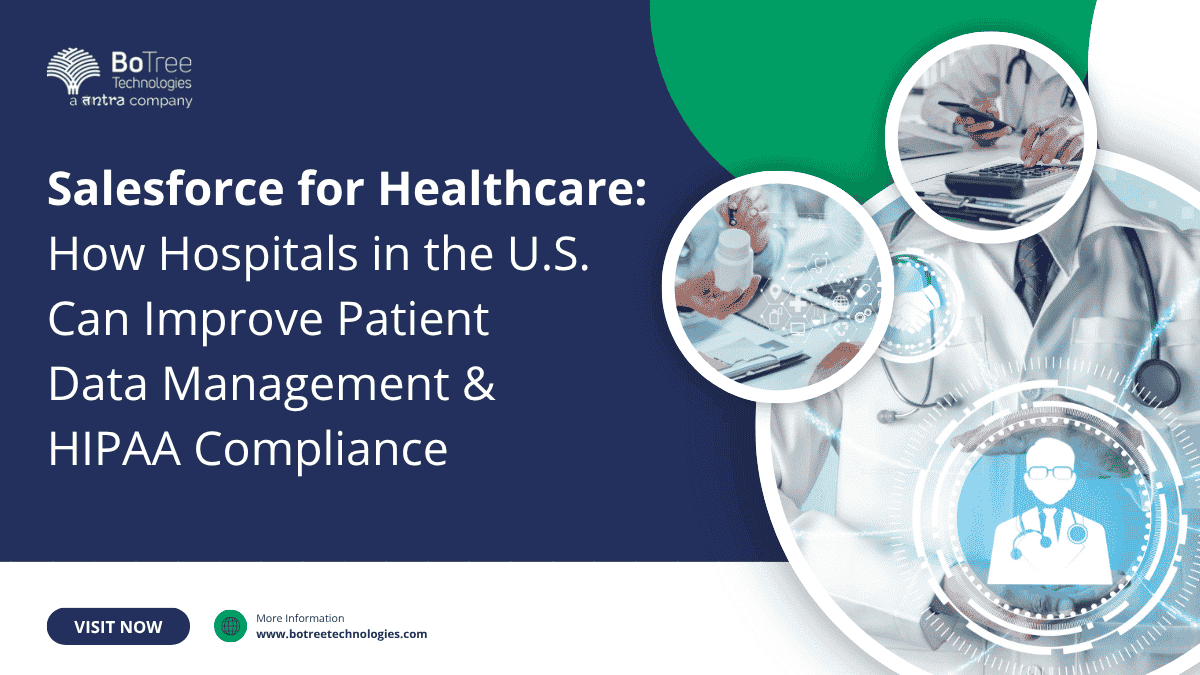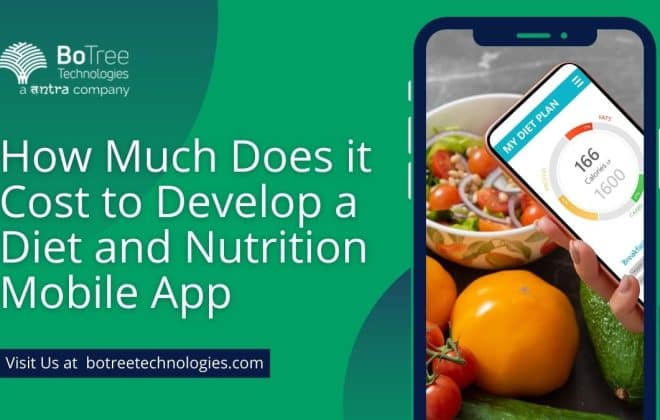
Salesforce for Healthcare: How Hospitals in the U.S. Can Improve Patient Data Management & HIPAA Compliance
This guide shows how Health Cloud consolidates scattered data into a secure Patient 360 view, enforces HIPAA compliance with built-in safeguards, and leverages Salesforce Shield for encryption and auditing. You’ll discover best practices for EHR integration, training and governance tactics to keep teams ready, tips for engaging expert partners, and strategies to bake privacy into every workflow. By the end, you’ll have a clear roadmap to privacy-first, patient-centered care. Continue reading to learn more.
Imagine you’re a nurse wrapping up rounds for the evening. You glance at your dashboard on Salesforce Health Cloud and notice a patient’s vitals trending upward – and an urgent lab result just came in. Before you even head to the nurse’s station, you’ve reviewed their history, coordinated care tasks with the physician, and sent a secure follow-up message to the patient’s caregiver. All without logging into five different systems, all while knowing every click is fully audited and encrypted to meet HIPAA standards. That seamless, secure experience is what modern hospitals can – and should – deliver for both care teams and patients, and it’s possible with Salesforce for healthcare.
In this guide, we’ll walk you through how Salesforce empowers U.S. hospitals to transform scattered patient data into a unified, secure “Patient 360” view, address every nook and cranny of HIPAA compliance, and build a culture of privacy-first, patient-centered care. We’ll cover:
- Why HIPAA compliance matters more than ever, and what you risk when it’s overlooked
- How Health Cloud’s core features lay the groundwork for secure patient data management
- Why Salesforce Shield is the next guardrail in your data-protection strategy
- Best practices for integrating EHR systems without creating new security gaps
- Training and governance tactics to keep your team aligned and audit-ready
- When and how to engage expert partners for tailored solutions that scale
By the end, you’ll have a clear blueprint for turning compliance from a burdensome checklist into a strategic advantage – so your staff can focus on what matters most: delivering exceptional care.
The Imperative of HIPAA Compliance in Modern Healthcare
Understanding HIPAA and Its Significance
At its core, HIPAA (Health Insurance Portability and Accountability Act) exists to protect the privacy and security of patients’ health information. Think of it as a promise: patients trust you with their most sensitive data – medical histories, diagnoses, medication lists. HIPAA’s two main pillars enforce that promise:
- Privacy Rule: Defines who can access or share Protected Health Information (PHI) and grants patients rights – like requesting their own records or restricting certain disclosures.
- Security Rule: Specifies the administrative, physical, and technical safeguards needed to keep electronic PHI (ePHI) confidential, intact, and available.
HIPAA applies not only to hospitals and clinics (covered entities) but also to their vendors and partners (business associates) who handle PHI on their behalf. If you store, process, or transmit patient data without the right controls, you’re setting yourself up for serious trouble.
Consequences of Non-Compliance
You may think, “We have firewalls and antivirus – aren’t we secure enough?” Unfortunately, HIPAA isn’t just about perimeter defense. It demands end-to-end accountability:
- Financial Penalties
Violations can cost $100 to $50,000 per infraction, with a yearly cap of $1.5 million. Even a single breach of unsecured PHI can land you in the hot seat and put your hospital’s budget in jeopardy. - Regulatory Audits
The Office for Civil Rights (OCR) routinely investigates breaches. Once flagged, you may face invasive audits across all your systems and processes, diverting staff time away from patient care. - Reputational Damage
Word travels fast. A breach erodes community trust, leads patients to switch providers, and makes insurers and partners wary of collaborating with you. - Legal Exposure
Beyond OCR fines, patients can pursue class-action lawsuits for negligence in protecting their data.
In short: HIPAA non-compliance isn’t just a checkbox – it’s a liability that undermines both patient safety and your institution’s sustainability.
Leveraging Salesforce Health Cloud for Secure Patient Data Management
Overview of Salesforce Health Cloud
Salesforce Health Cloud is more than “just” a CRM. It’s a purpose-built platform that brings clinical and non-clinical data into a single, holistic “Patient 360” profile. Here are Salesforce healthcare benefits for your hospital:
- Unified Patient Profiles
Demographics, clinical encounters, lab results, medication lists, care plans, and even social determinants of health (food insecurity, housing instability) live side by side. Care teams get full context for every decision. - Seamless Care Coordination
Assign tasks, set reminders, and collaborate across disciplines – nurses, physicians, care managers – without chasing down emails or sticky notes. - Digital Engagement Tools
From secure patient portals to in-app messaging, video visits, and automated appointment reminders, Health Cloud keeps patients connected and informed, all under strict privacy controls. - Enterprise-Grade Compliance
Built on Salesforce’s multi-tenant architecture, Health Cloud inherits certifications like HIPAA, HITRUST, and FedRAMP, with options for Government Cloud for extra isolation.
By consolidating systems onto Health Cloud, you dramatically reduce data silos, enforce consistent security policies, and give your staff a single source of truth – so they spend less time toggling between apps and more time at the bedside.
Key Features Supporting HIPAA Compliance
Health Cloud includes a suite of native features for digital transformation solutions that directly map to HIPAA’s Security Rule requirements:
- Role-Based Access Controls (RBAC)
Define fine-grained permissions at the object, record, and even field level. For example, front-desk staff can schedule appointments but won’t see sensitive mental-health notes, while psychiatrists have broader access. - Audit Trails & Field History Tracking
Every creation, update, deletion, or export of PHI is logged with user, timestamp, and location metadata. That audit log is searchable and tamper-resistant – exactly what OCR looks for during investigations. - Encryption In Transit & At Rest
All network traffic uses TLS 1.2+ encryption. Data at rest in Salesforce’s data centers is protected with AES-256 encryption. For extra control, you can bring your own encryption keys (BYOK). - Event Monitoring
Get near-real-time visibility into user behavior, API calls, report exports, and more. Integrate these logs with your Security Information and Event Management (SIEM) tools to detect anomalies – like bulk exports or access outside business hours – before they turn into breaches. - Consent & Privacy Management
Track patient consents for data sharing, marketing communications, or research studies. Automate policy enforcement so you never accidentally share PHI without the proper authorizations.
With these capabilities, Health Cloud transforms compliance from a periodic audit exercise into an always-on, baked-in safeguard.
Implementing Salesforce Shield for Enhanced Data Security
Understanding Salesforce Shield Components
While Health Cloud technology consulting solutions secure your core workflows, Salesforce Shield adds an extra layer of protection designed for environments with heightened security needs:
- Field Audit Trail
- Retains detailed history of field changes for up to ten years – often required for HIPAA retention guidelines.
- Lets you reconstruct any record’s evolution over time, critical for forensics and compliance reporting.
- Retains detailed history of field changes for up to ten years – often required for HIPAA retention guidelines.
- Platform Encryption
- Applies FIPS 140-2-compliant encryption at the database level, covering fields, files, and attachments.
- Supports BYOK or Salesforce-managed key options with centralized key rotation and governance.
- Applies FIPS 140-2-compliant encryption at the database level, covering fields, files, and attachments.
- Event Monitoring Analytics
- Delivers curated security and performance events – login failures, API calls, data exports – so your security team can build dashboards and automated alerts.
- Enables proactive threat detection by highlighting unusual patterns: mass downloads, odd log-in locations, or spikes in outbound API calls.
- Delivers curated security and performance events – login failures, API calls, data exports – so your security team can build dashboards and automated alerts.
Benefits of Salesforce Shield in Healthcare Settings
By layering Shield atop Health Cloud, you gain:
- Insider Threat Mitigation
Even system administrators without explicit permissions can’t read encrypted fields, shrinking your attack surface from within. - Extended Audit Readiness
Automated retention of data-change histories and event logs eliminates manual exports or custom archival scripts. - Proactive Security Operations
Real-time alerts fuel faster incident response: imagine receiving a notification when someone tries to export thousands of records at 3 AM, allowing you to intervene before data leaves your environment. - Seamless Integration into Governance
Shield’s features plug directly into your change-management workflows, CI/CD pipelines, and DevSecOps toolchains – so security scales alongside development.
With Shield in place, your hospital can confidently handle high-risk PHI workflows – like telemedicine sessions and remote patient monitoring – without adding administrative friction for caregivers.
Integrating Electronic Health Records (EHR) with Salesforce
Importance of EHR Integration
Your EHR system is the lifeblood of clinical operations: charting, orders, imaging, and more. But when it lives in a silo, every handoff between systems becomes a risk:
- Data Entry Errors
Manual re-keying invites mistakes that can jeopardize patient safety. - Delayed Care Coordination
Lab results or radiology notes may not reach the right person in time. - Fragmented Patient Views
Clinicians lack a holistic picture, leading to redundant tests or missed diagnoses.
Integrating your EHR with Health Cloud – using standards like HL7 v2 or FHIR APIs – bridges those gaps. You ingest real-time updates on encounters, medications, allergies, and more into Patient 360. As a result, you reduce duplication, empower care teams with complete context, and enable advanced use cases like population health analytics or value-based-care reporting.
Best Practices for Secure Data Integration
To maintain HIPAA compliance in healthcare software product engineering solutions throughout your integration journey, follow these proven tactics:
- Leverage Pre-Built Connectors & Accelerators
- Use MuleSoft’s Healthcare Accelerator or Salesforce’s OmniStudio FHIR DataRaptor flows to standardize mappings and reduce custom code.
- Benefit from community-tested templates that handle common FHIR resources – Patients, Observations, Conditions – securely out of the box.
- Use MuleSoft’s Healthcare Accelerator or Salesforce’s OmniStudio FHIR DataRaptor flows to standardize mappings and reduce custom code.
- Encrypt Data In Transit & At Rest
- Enforce TLS 1.2+ on every integration endpoint.
- Once data lands in Salesforce, re-encrypt PHI fields with Shield Platform Encryption to maintain end-to-end confidentiality.
- Enforce TLS 1.2+ on every integration endpoint.
- Adopt a Hybrid Storage Strategy
- For fast clinical lookups, store only essential metadata in Health Cloud.
- Keep full clinical records in your data lake or native EHR, pulling details on demand via authenticated APIs – minimizing exposure of sensitive data.
- For fast clinical lookups, store only essential metadata in Health Cloud.
- Centralize Error Handling & Audit Logging
- Route failed messages to an encrypted dead-letter queue.
- Automate notifications to integration and security teams, and archive raw payloads in a secure, HIPAA-compliant repository for review.
- Route failed messages to an encrypted dead-letter queue.
- Perform Regular Penetration Testing
- Include all integration middleware, API gateways, and custom endpoints in your quarterly security scans.
- Validate against OWASP Top 10 and HITRUST/HIPAA pen-test criteria to uncover vulnerabilities before attackers do.
- Include all integration middleware, API gateways, and custom endpoints in your quarterly security scans.
By building your integrations on these pillars, you’ll maintain a lockstep balance between data agility and airtight security.
Training and Governance for Sustained Compliance
Staff Training on Data Security Protocols
Even the best technology can’t compensate for human error. That’s why ongoing, role-based training is critical by a software product engineering company:
- Clinicians learn secure mobile-device usage, how to verify patient identities in patient portals, and best practices for telehealth.
- Administrative Staff deepen their understanding of data-sharing rules, consent management, and breach-reporting workflows.
- IT & Security Teams master Shield configuration, key-management processes, and SIEM integrations.
Best-in-class programs blend live workshops, on-demand eLearning, and hands-on Trailhead modules tailored to your hospital’s specific Salesforce configuration. Quarterly phishing simulations and tabletop exercises around mock breach scenarios reinforce vigilance and refine your incident-response playbook.
Establishing Governance Policies
Policies are the rails that keep your compliance train on track. Start by drafting a Data Governance Charter that:
- Defines Clear Roles
- Privacy Officer: Owns HIPAA compliance oversight, risk assessments, and OCR interactions.
- Data Stewards: Manage data quality, classification, and retention schedules.
- Security Champions: Liaise between IT and clinical teams to surface policy changes and training needs.
- Privacy Officer: Owns HIPAA compliance oversight, risk assessments, and OCR interactions.
- Formalizes Vendor Agreements
- Ensure every vendor handling PHI – EHR providers, telehealth platforms, data-analytics firms – signs a Business Associate Agreement (BAA) that mirrors your own risk tolerance.
- Ensure every vendor handling PHI – EHR providers, telehealth platforms, data-analytics firms – signs a Business Associate Agreement (BAA) that mirrors your own risk tolerance.
- Enforces Change-Management Gates
- Any configuration or code change touching PHI fields must pass through defined approval processes, complete with security and privacy sign-offs.
Use Salesforce’s native Approval Processes, Change Sets, and Sandbox cloning to automate these gates – so no code or config slips through without scrutiny.
Partnering with Experts for Customized Solutions
Role of Technology Consulting Partners
Your hospital’s environment is unique: legacy EMRs, specialized research databases, referral networks, and regional regulation nuances. A seasoned Salesforce consulting partner can:
- Run Discovery Workshops
Map your current systems, compliance gaps, and key workflows in rapid, interactive sessions. - Prototype & Pilot
Build proof-of-concept Health Cloud and Shield use cases – like a telehealth consent flow or remote-patient-monitoring dashboard – so you can validate before scaling. - Guide OCR Audits
Assemble risk-assessment documentation, breach-notification plans, and audit artifacts specific to your Salesforce implementation.
With expert guidance, you avoid common pitfalls – like over-customizing objects or under-estimating data-retention needs – and accelerate time to value.
Benefits of Customized Software Engineering
Off-the-shelf functionality often needs a boost to meet the exacting demands of modern healthcare. Custom engineering delivers:
- Compliance-By-Design
Encryption, access controls, and audit logging built right into each Lightning Component, Heroku microservice, or Middleware layer. - Scalable, Modular Architectures
API-first designs let you swap out integration middleware or add new care channels – telemetry streams, AI-driven risk scores – without rewriting core systems. - DevSecOps Pipelines
Continuous integration pipelines that include automated security scans, code reviews, and key rotations ensure every release meets HIPAA benchmarks before it hits production.
By blending Salesforce’s platform strengths with precisely engineered extensions, a healthcare app development company offers the flexibility to innovate – whether rolling out a new patient-engagement app or launching a hospital-wide data-analytics initiative – without compromising security or compliance.
Conclusion: Embracing Salesforce for a Secure Healthcare Future
Turning data security into a strategic differentiator starts with a mindset shift: from “How do we just check the HIPAA box?” to “How do we bake privacy and trust into every aspect of care?” Salesforce Health Cloud, fortified by Shield, seamless EHR integrations, and underpinned by rigorous training and governance, offers a roadmap to that future. Add seasoned consulting and custom engineering, and you’ll not only protect PHI – you’ll unlock new levels of patient engagement, care coordination, and operational efficiency.
By embracing this integrated approach, your hospital can:
- Boost Patient Trust: Demonstrate commitment to privacy at every interaction.
- Enhance Care Outcomes: Give clinicians the context and tools they need, right when they need them.
- Streamline Audits: Replace frantic, manual compliance efforts with automated logs and approval processes.
- Accelerate Innovation: Prototype and deploy new services – telehealth, remote monitoring, AI-driven insights – without fear of regulatory pushback.
The future of healthcare software development is both digital and data-driven. When you partner with Salesforce and its ecosystem of experts, you’re choosing a path where compliance fuels innovation, caregivers are empowered, and patient data remains a source of trust rather than worry. Let’s build that future – together.




